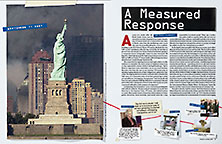 While the Center on Law and Security was formed in reaction to 9/11, David Golove takes a much longer view. In a paper in-progress, “The Case for Incorporating Global Justice into the U.S. Constitution,” Golove, Hiller Family Foundation Professor of Law, brings 150-year-old concepts of how “civilized nations” ought to conduct themselves into the 21st century. The concepts are found in the Law of War, a collection of understandings among nations about the constraints on armed conflict that includes the Geneva Conventions, which forbid the torture of prisoners of war. “The United States is a civilized nation,” Golove explains.
While the Center on Law and Security was formed in reaction to 9/11, David Golove takes a much longer view. In a paper in-progress, “The Case for Incorporating Global Justice into the U.S. Constitution,” Golove, Hiller Family Foundation Professor of Law, brings 150-year-old concepts of how “civilized nations” ought to conduct themselves into the 21st century. The concepts are found in the Law of War, a collection of understandings among nations about the constraints on armed conflict that includes the Geneva Conventions, which forbid the torture of prisoners of war. “The United States is a civilized nation,” Golove explains.
“It recognizes the obligations of civilized behavior, even to its enemies, and that recognition should have a constitutional dimension.” These obligations apply both to the president and Congress, he claims.
The roots of the Law of War are found in guidelines Abraham Lincoln imposed on the Union Armies during the Civil War, and in arguments his administration made to justify such extreme exercises of executive authority as the naval blockade of Southern ports and the denial of habeas corpus protection for allegedly disloyal citizens. In each instance, Lincoln and his aides contended that he acted properly “within the rules of civilized warfare,” Golove recounts in his 2003 paper “Military Tribunals, International Law, and the Constitution: A Franckian-Madisonian Approach.”
The Bush administration adopted a different posture: that the president possesses inherent power to defy the law to protect national security. After President Bush added an ambiguous signing statement to 2005 legislation outlawing torture, Golove played a leading role in challenging it. Golove told the Boston Globe: “The signing statement is saying, ‘I will only comply with this law when I want to, and if something arises in the war on terrorism where I think it’s important to torture or engage in cruel, inhuman, and degrading conduct, I have the authority to do so.’” Later, officials confirmed that this was indeed the White House position.
Golove’s analysis doesn’t boil down simply to What Would Lincoln Do, however. “Lincoln did make a radical—and doubtful—claim of executive power,” the scholar says. “But that claim provides no precedent for the kind of powers that the Bush administration has asserted.” It’s critically important, he says, that Lincoln told Congress what he had done and promised to abide by lawmakers’ judgment on the legitimacy of his actions. “In contrast, the Bush administration acted secretly and withheld from Congress and the public the legal theories on which he was acting,” Golove says. “Moreover, the Bush administration has repeatedly claimed that the radical powers [Bush] assert[ed] are not only inherent executive powers but are exclusive powers, and that Congress is without any authority to override his decisions. These are hugely significant differences.”
—
